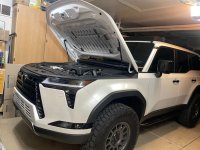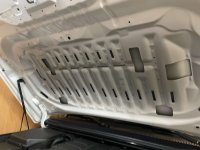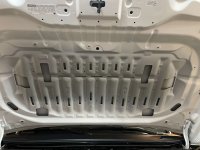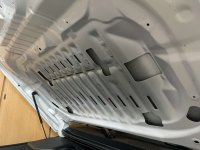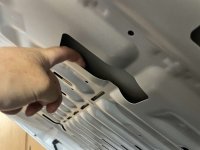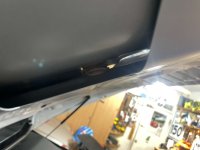OK, the little replacement clips for the black under-hood mouse fur "insulation layer" arrived so I popped out all the factory clips with a body panel clip pulling tool. They break upon removal, not the re-usable type. The black panel is just for show, paper-thin, backed with cheapo fiberboard about as thick as a human hair.
Here is the Amazon page for the clips - $10 for 25 pieces, you need 10...always good to get extras:
Amazon.com
So, the underside of the hood panel is actually highly-engineered. Lots of structural bends, air flow slots, etc. On the topside of the hood, the outer wheel-location humps over the fenders have bends that obviously define the fenders. These major bends on each side give it plenty of rigidity in this area. Furthermore, there are little rubbery plugs that wedge between the low sides of the fender bends and the inner hood structural panel, which supports this bend line from below. See the pics below.
The problem is apparent: the topside expanse in the middle of the hood appears to be completely unconnected to, and unsupported by, the underside structural panel. Coincidentally, this is the part that flutters at highway speeds. This topside expanse is about 40" wide across the hood.
It looks like sound deadening paneling (butyl or foam padding) is not going to work because you can't apply it directly to the underside of the topside, if you see what I mean. The inner underside structural panel is in the way.
I'm thinking that some rubber spacers stuck in there (like the factory rubbery plugs already installed under the bends) would do the trick to form a wedge between the inner structural panel and the topside expanse. Or, maybe even easier, would be to spray some heat-resistant expanding foam up in the little cutouts all across the expanse. I wonder if this would bulge the hood? Probably not if you let it just expand freely and ooze out the little cutouts and the sides, then trim it clean. Would really suck to bulge your hood trying to fix a flutter...LOL. Maybe just stuff some thermal batting up in there?
Opinions?
Here is the Amazon page for the clips - $10 for 25 pieces, you need 10...always good to get extras:
Amazon.com
So, the underside of the hood panel is actually highly-engineered. Lots of structural bends, air flow slots, etc. On the topside of the hood, the outer wheel-location humps over the fenders have bends that obviously define the fenders. These major bends on each side give it plenty of rigidity in this area. Furthermore, there are little rubbery plugs that wedge between the low sides of the fender bends and the inner hood structural panel, which supports this bend line from below. See the pics below.
The problem is apparent: the topside expanse in the middle of the hood appears to be completely unconnected to, and unsupported by, the underside structural panel. Coincidentally, this is the part that flutters at highway speeds. This topside expanse is about 40" wide across the hood.
It looks like sound deadening paneling (butyl or foam padding) is not going to work because you can't apply it directly to the underside of the topside, if you see what I mean. The inner underside structural panel is in the way.
I'm thinking that some rubber spacers stuck in there (like the factory rubbery plugs already installed under the bends) would do the trick to form a wedge between the inner structural panel and the topside expanse. Or, maybe even easier, would be to spray some heat-resistant expanding foam up in the little cutouts all across the expanse. I wonder if this would bulge the hood? Probably not if you let it just expand freely and ooze out the little cutouts and the sides, then trim it clean. Would really suck to bulge your hood trying to fix a flutter...LOL. Maybe just stuff some thermal batting up in there?
Opinions?
